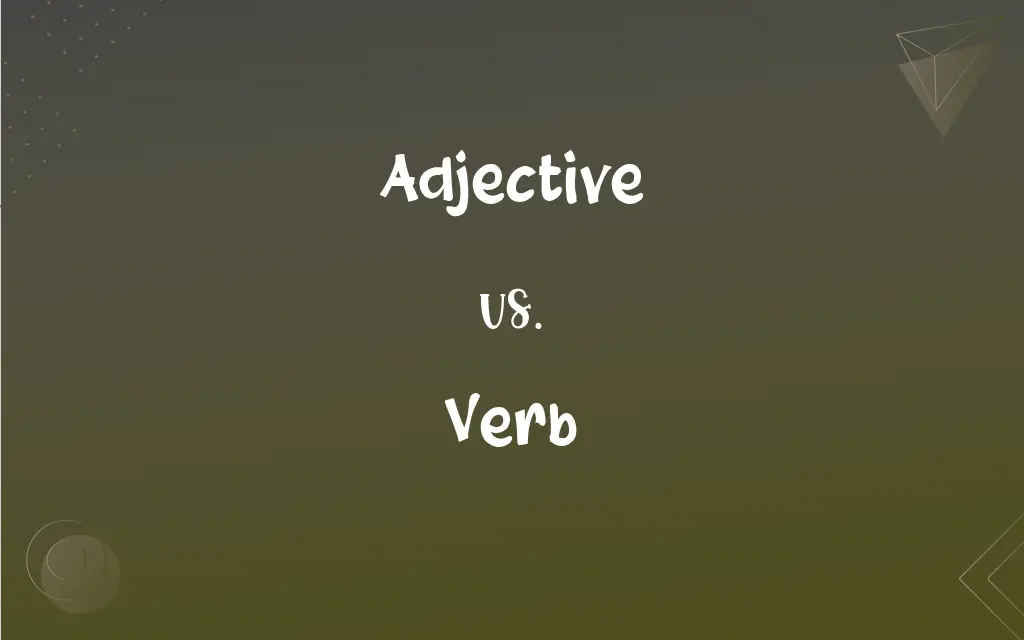Adjective vs. Verb: What's the Difference?
Edited by Harlon Moss || By Janet White || Published on January 14, 2024
Adjective is a word used to describe or modify a noun. Verb is a word used to express an action, occurrence, or state of being.

Key Differences
An adjective is a part of speech that describes, identifies, or quantifies a noun or a pronoun. In contrast, a verb is a part of speech that indicates action, occurrence, or a state of being. While adjectives provide details about the features or qualities of nouns, verbs indicate what the subject is doing or experiencing.
Adjectives are used to add color, size, shape, and various qualitative aspects to nouns. Verbs, on the other hand, are vital in forming the predicate of a sentence, illustrating what is happening. Adjectives modify nouns to make them more specific, whereas verbs are central to expressing the action or state of the nouns.
In a sentence, adjectives can appear before the noun they modify or after a linking verb. In contrast, verbs are positioned according to the subject and tense of the sentence, often following the subject. Adjectives enhance the noun's description, while verbs drive the sentence's action or state.
Adjectives can have comparative and superlative forms to indicate degrees of the quality. Verbs can be conjugated in various tenses to depict time and aspect of the action or state. The role of adjectives is to enrich the noun's meaning, while verbs are crucial in indicating time, process, and action.
Adjectives do not change to agree with the number, gender, or case of the nouns they describe. Verbs, however, change form to agree with the subject in number and sometimes gender. Adjectives remain constant in form, providing stable attributes to nouns, whereas verbs are dynamic, changing with the subject and tense.
ADVERTISEMENT
Comparison Chart
Function in a Sentence
Describes or modifies a noun
Expresses action, occurrence, or state
Position
Typically before a noun or after a linking verb
Follows the subject; position varies with tense
Forms
Can have comparative and superlative forms
Conjugated in various tenses
Agreement with Nouns
Does not change for number, gender, or case
Changes form to agree with the subject in number (and sometimes gender)
Role
Enhances the description of a noun
Indicates the action, state, or process in a sentence
ADVERTISEMENT
Adjective and Verb Definitions
Adjective
A word that describes a noun or pronoun.
The sky is a brilliant blue today.
Verb
A word that expresses action.
She runs every morning.
Adjective
Can indicate the quantity of nouns.
There are several books on the table.
Verb
Indicates the state of being.
He is a teacher.
Adjective
Used to add information about size, color, shape, or other qualities.
She wore a long, red dress.
Verb
Used to show occurrence or happenings.
It rained heavily last night.
Adjective
Often used before nouns to add specific details.
The noisy crowd cheered loudly.
Verb
Can be conjugated to show tense, mood, and voice.
They have completed their work.
Adjective
Can appear after linking verbs to describe the subject.
The flowers smell fragrant.
Verb
Forms the main part of the predicate of a sentence.
The cat sleeps on the sofa.
Adjective
The part of speech that modifies a noun or other substantive by limiting, qualifying, or specifying and distinguished in English morphologically by one of several suffixes, such as -able, -ous, -er, and -est, or syntactically by position directly preceding a noun or nominal phrase.
Verb
The part of speech that expresses existence, action, or occurrence in most languages.
Adjective
Any of the words belonging to this part of speech, such as white in the phrase a white house.
Verb
Any of the words belonging to this part of speech, as be, run, or conceive.
FAQs
Can adjectives be used without nouns?
Typically, no; they modify nouns or pronouns.
Do adjectives have tenses?
No, adjectives do not have tenses.
Can verbs be in a sentence without a noun?
Yes, as in commands or requests.
Are adjectives necessary in a sentence?
Not always, but they provide more detail.
Can an adjective come after the noun it describes?
Yes, especially after linking verbs.
Do verbs always agree with the subject?
Yes, in number and sometimes in gender.
Are all verbs action words?
Not all; some verbs express a state of being.
Do adjectives change according to the gender of the noun?
In English, they do not change for gender.
Can adjectives be used as adverbs?
Some can, but often with different forms.
Can verbs change their form?
Yes, verbs change form based on tense and subject.
Do verbs indicate the time of action?
Yes, through different tenses.
Are there verbs that don’t show action?
Yes, like "is" or "seem," showing a state.
Do adjectives have opposites?
Yes, like "hot" and "cold."
Are verbs essential in every sentence?
Yes, to form a complete thought.
Are there different types of adjectives?
Yes, including descriptive, quantitative, and demonstrative.
Are there irregular verbs?
Yes, like "go" and "went."
Can verbs be in passive form?
Yes, like "was done."
Can a verb function as a noun?
Yes, in the form of a gerund.
How many adjectives can modify a single noun?
Multiple, as long as they make sense together.
Can adjectives form superlatives?
Yes, like "tallest" or "smartest."
About Author
Written by
Janet WhiteJanet White has been an esteemed writer and blogger for Difference Wiki. Holding a Master's degree in Science and Medical Journalism from the prestigious Boston University, she has consistently demonstrated her expertise and passion for her field. When she's not immersed in her work, Janet relishes her time exercising, delving into a good book, and cherishing moments with friends and family.
Edited by
Harlon MossHarlon is a seasoned quality moderator and accomplished content writer for Difference Wiki. An alumnus of the prestigious University of California, he earned his degree in Computer Science. Leveraging his academic background, Harlon brings a meticulous and informed perspective to his work, ensuring content accuracy and excellence.






































































